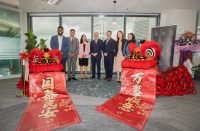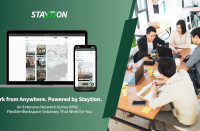The traditional office model has undergone a quiet yet consequential transformation in Singapore. As remote and hybrid work arrangements continue to reshape professional routines across the city, many individuals are finding that working from home is not always ideal. Factors such as limited space, distractions, and a lack of social interaction have prompted a shift toward more adaptable environments that support productivity without the rigidity of corporate offices.
In this context, demand for alternative workspaces has grown. Notably, the option to have a shared office in Singapore has evolved into more than a stopgap solution, but a viable choice for many professionals. These hubs offer structure, resources, and a sense of belonging that many remote workers and entrepreneurs value. What was once a niche concept is now embedded in Singapore’s broader work culture.
This article examines how shared office hubs are redefining work in Singapore, with particular attention to the evolving needs of today’s professionals.
The Shift Toward Neighbourhood Coworking Spaces
Coworking spaces were once concentrated in Singapore’s central business districts and catered mainly to startups and freelancers who wanted proximity to corporate offices and clients. In recent years, however, this pattern has shifted. Shared workspaces are increasingly emerging in residential and decentralised areas, from Tampines and Jurong to Paya Lebar and Woodlands. This change reflects a growing demand for work environments that reduce commute times while offering professional infrastructure closer to home.
Even government agencies have taken notice. In 2023, the former Tampines Regional Library was repurposed into a “work-near-home” facility to support the public service officers of the Ministry of Defence who live nearby. The initiative forms part of broader efforts to encourage flexible work arrangements and improve work-life balance. By bringing office-grade amenities to the heartlands, such projects reinforce the appeal and viability of localised coworking models.
Now that businesses are continuing to explore hybrid setups and cost-effective alternatives to traditional leases, satellite hubs positioned in neighbourhoods are likely to play a larger role in Singapore’s future work ecosystem.
Why Community Still Matters in Remote Work
The convenience of working remotely can sometimes come at the cost of isolation. While digital tools have made it easier to collaborate across distances, they often fall short in replicating the informal connections and spontaneous exchanges that take place in shared physical spaces. For many remote workers and independent entrepreneurs, the absence of such interactions can affect motivation, creativity, professional growth, and even mental well-being.
Shared office hubs aim to bridge this gap by offering more than a desk and internet connection. Many are intentionally designed to foster community through curated events or skill-sharing sessions, while others integrate collaborative zones that invite spontaneous exchange. These environments encourage organic interaction among people from diverse industries by creating opportunities for networking, mentorship, and collaboration, which are not easily replicated in remote-only settings. For freelancers and solo business owners in particular, this sense of community can provide a valuable support system.
In Singapore’s competitive and fast-paced economy, having access to a space that promotes both independent work and social engagement allows individuals to remain connected without compromising autonomy. It is this balance that continues to draw people toward coworking spaces as a long-term solution rather than a temporary fix.
Features That Make Coworking Spaces Work Better
Today’s shared office hubs have evolved far beyond the basics. Once offering only flexible seating and Wi-Fi, many coworking spaces are now equipped with features that cater to a wide range of professional and personal needs. This includes dedicated meeting rooms, private phone booths, soundproof pods, wellness rooms, and even childcare services in select locations. These additions help remote workers and entrepreneurs manage their daily responsibilities without stepping away from a productive setting.
Technology integration also plays a key role. Many coworking spaces now use digital booking systems, virtual reception tools, and access control apps to streamline operations and enhance user experience. These tools simplify routine tasks by allowing members to focus on their work with minimal disruption. Some hubs also provide on-site technical support and give users access to troubleshooting or setup assistance when needed.
This emphasis on adaptability and functionality reflects the growing expectations of today’s professionals. As work becomes increasingly fluid and project-based, having access to infrastructure that supports both focus and flexibility is no longer optional but a deciding factor when choosing where to work.
Supporting Flexible and Hybrid Work Models
The widespread adoption of flexible and hybrid work arrangements has prompted businesses and workers alike to rethink what an office should provide. Rather than committing to long-term leases in central locations, many companies are exploring distributed work models supported by coworking memberships. This approach allows employees to work closer to home while still accessing reliable facilities for collaboration or focused tasks.
Shared office hubs are well-positioned to support these evolving needs. Some offer multi-location access, enabling users to choose the most convenient workspace on any given day. Others provide tailored solutions for small teams or part-time office use and help businesses stay nimble in an unpredictable operating environment. For remote workers, these options can reintroduce structure and routine without sacrificing the flexibility gained from working off-site.
The ability to scale workspace usage based on changing operational demands is especially valuable in a city like Singapore, where space is limited and business costs remain high. Work has become increasingly decentralised and mobile, and coworking spaces are expected to remain a practical choice for supporting agile work models across different sectors.
The rise of shared office hubs in Singapore exemplifies a profound shift in how professionals approach work, space, and collaboration. Given how fluid work patterns are, these hubs provide a flexible, future-ready alternative to conventional offices—one that empowers individuals with a sense of community and businesses with agility. For professionals and enterprises moving through this dynamic landscape, shared workspaces are not only practical solutions; they form a vital foundation for sustained growth and connection in the modern era.




